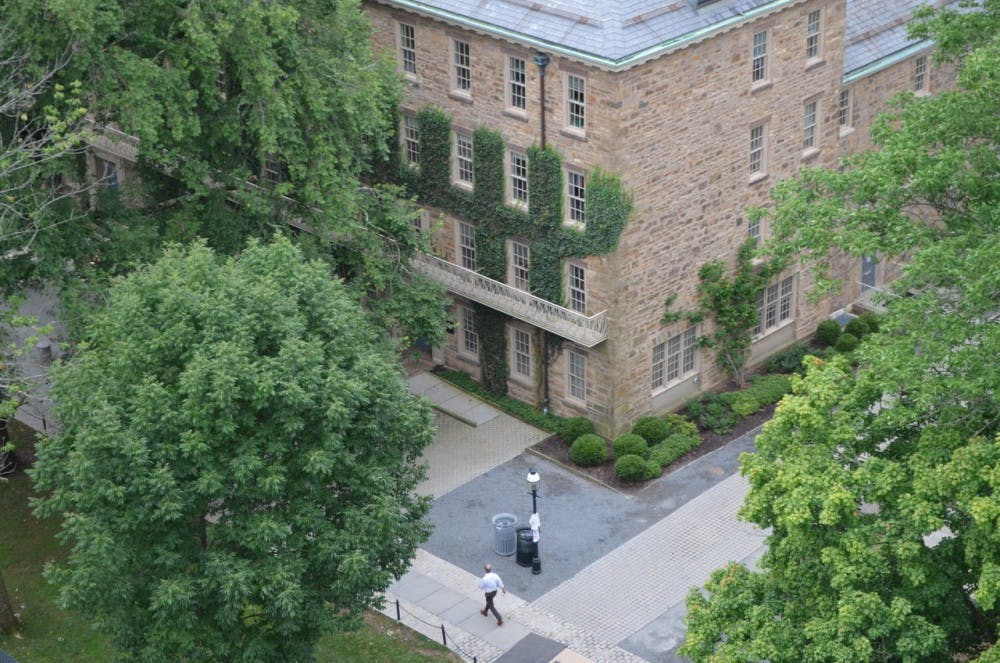The University recently named Pulitzer Prize-winning theater critic and writer Hilton Als an inaugural Presidential Visiting Scholar for the 2020–2021 academic year. The Visiting Scholars program brings leaders in academic or professional fields to the University to increase diversity among the University’s faculty.
According to Dean of the Faculty Sanjeev R. Kulkarni, Als was nominated by Tracy K. Smith, the current Chair for the Lewis Center for the Arts, who praised “his genius for writing about race, gender and sexuality with profound honesty, vulnerability and intelligence.”
“Hilton Als is a fantastic selection as our inaugural Presidential Visiting Scholar, and we’re excited to welcome him as we launch this important new way to bring outstanding scholars to Princeton,” Kulkarni wrote.
The Presidential Visiting Scholars program commenced in December 2018 alongside the Presidential Postdoctoral Research Fellows, a related initiative, now in its second year, that supports a cohort of early-career scholars.
“Both programs are intended to recognize and support scholars who can contribute to the University’s diversity, broadly defined, including members of groups that have been historically and presently underrepresented in the academy or in particular disciplines, such as racial and ethnic minorities and women in STEM,” Kulkarni wrote in an email to The Daily Princetonian.
Appointed for the full academic year, Presidential Visiting Scholars are responsible for one public lecture or event per semester. Though not required, the scholars are encouraged to teach or participate in an undergraduate or graduate course if they wish to have greater exchange with students.
Both the Presidential Visiting Scholars and the Presidential Postdoctoral Research Fellows are overseen by the Office of the Dean of the Faculty, with support from the Office of the President and the Office of the Provost. Department chairs nominate candidates for the visiting scholars program to the Office of the Dean of the Faculty, and the Faculty Advisory Committee on Diversity ultimately selects recipients.
Als is a nationally renowned critic and writer. He first began contributing to The New Yorker in 1989, writing pieces for The Talk of the Town, before becoming a staff writer in 1994. He became a theater critic in 2002.

Als is the author of “The Women” (1996) and “White Girls,” a finalist for the National Book Critics Circle Award, and the winner of the Lambda Literary Award in 2014. Als also edited the catalogue for the 1994–95 Whitney Museum of American Art exhibition “Black Male: Representations of Masculinity in Contemporary American Art” and published “Justin Bond/Jackie Curtis” (2010).
Throughout his career, Als has engaged in conversations and collaborations across mediums. Als worked with performer Justin Bond on an exhibition of paintings, drawings, and videos by performers called “Cold Water” at La MaMa Gallery (2009); co-curated “Self-Consciousness” at the VeneKlasen/Werner gallery in Berlin (2010); collaborated with artist Celia Paul to create the exhibition “Desdemona for Celia by Hilton” for the Metropolitan Opera’s Gallery Met (2015); and curated “Alice Neel, Uptown,” which was named one of the 10 best shows of the year by three critics at “Artforum.” Als’s accompanying book on Alice Neel also garnered praise.
In 1997, Als was awarded first prize in both Magazine Critique/Review and Magazine Arts and Entertainment by The New York Association of Black Journalists. He was honored with a Guggenheim Fellowship for creative writing in 2000 and the George Jean Nathan Award for Dramatic Criticism for 2002–2003. In 2016, he won the Lambda Literary’s Trustee Award for Excellence in Literature.
Als won the Pulitzer Prize for Criticism in 2017. Announcing his win, The New Yorker praised Als’s “rigorous, sharp, and lyrical perspective on acting, playwriting, and directing” and described Als’s reviews as “not simply reviews; they are provocative contributions to the discourse on theatre, race, class, sexuality, and identity in America.”

In an interview with the Paris Review, Als said, “For me, writing is a way of struggling through the intricacies of an antiempirical sensibility. And there must be words other than fiction and nonfiction. I see fiction not as the construction of an alternate world but as what your imagination gives you from the real world.”
“On the other hand, I wonder if there’s a way of writing the truth when you’re queer that’s different than if you’re straight. Is there a way of writing the truth if you’re of color, if you’re Afro-Caribbean, that’s different than if you’re white?” Als continued. “I’ve never read anything that helped me with this issue, except by the people who do it. I’m trying to learn how to be of service as a writer.”
This fall, at the University, Als will teach “Yaas Queen: Gay Men, Straight Women, and the Literature, Art, and Film of Hagdom,” a course aiming to explore the relationships between straight cis women and queer men by examining literature, photography, and painting. The course is cross-listed with the programs in Creative Writing and Theater in the Lewis Center for the Arts, as well as the Program in Gender and Sexuality Studies.
In addition, Als will mentor students in fiction, poetry, and playwriting.
“Als’s presence on campus will give the Creative Writing Program an opportunity to broaden its course offerings in creative nonfiction and enable the Lewis Center to expand its programming around questions of race, gender, sexuality and inclusion,” Kulkarni wrote.
Als is an associate professor of writing at Columbia University’s School of the Arts and has taught at Yale University, Wesleyan University, and Smith College. He lives in New York City.








